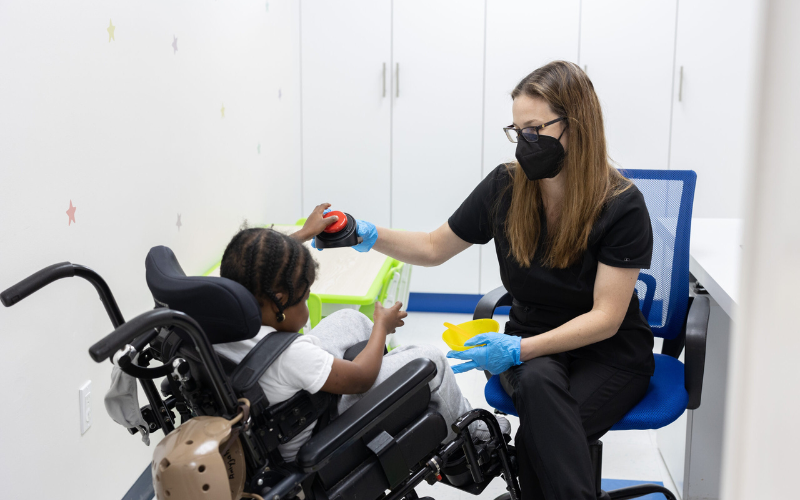Children with medical or developmental needs often require care beyond one area of expertise. Multidisciplinary pediatric care brings together professionals from different fields to work toward a single goal: helping each child grow, learn, and thrive.
Centers that follow this approach, such as Prescribed Pediatric Extended Care (PPEC) centers, create an environment where nursing, therapy, and education come together seamlessly. The result is comprehensive, compassionate care that supports every aspect of a child’s physical, emotional, and cognitive development.
What Makes Multidisciplinary Care Unique
Unlike traditional care models, where medical appointments, therapy sessions, and school activities are separate, multidisciplinary care integrates these services into one cohesive plan.
At a PPEC center, children receive medical supervision, therapy, and educational enrichment all in one place. Nurses, therapists, and teachers communicate daily, adjusting activities to meet each child’s changing needs. This collaboration builds consistency and ensures that medical stability and developmental growth happen hand in hand. It also helps families feel confident that their child’s progress is supported from every angle.
Nursing Support – The Core of Comprehensive Care
Nurses are at the heart of multidisciplinary pediatric care. They manage medications, monitor vital signs, and provide essential daily medical support. In a PPEC setting, nurses are key team members collaborating closely with therapists and educators.
For example, if a child experiences fatigue due to a medical condition, the nurse can recommend shorter therapy sessions or more frequent rest breaks. This level of coordination prevents setbacks and keeps care consistent. Nursing professionals also guide families in understanding their child’s health needs, ensuring that home routines align with clinical care. Their expertise provides a safe foundation for every other aspect of development.
Therapy Services – Helping Children Reach Their Potential
Therapy is central to helping children build independence and confidence. Physical, occupational, behavioral, and speech therapy each play a distinct role in supporting growth. Physical therapy improves mobility and strength, occupational therapy develops coordination and self-care skills, behavioral therapy supports emotional regulation and social development, and speech therapy enhances communication and feeding abilities.
In multidisciplinary settings, these services are not isolated activities. Therapists share progress notes and insights with nurses and educators to keep goals consistent. For instance, a speech therapist might collaborate with a teacher to incorporate vocabulary practice into classroom activities. A physical therapist might adjust exercises based on nursing updates about a child’s medical tolerance.
This integrated approach allows progress to be tracked holistically, ensuring that every success—no matter how small—contributes to long-term development.
Educational Support – Fostering Growth and Learning
Education is vital to every child’s daily routine, even for those with medical complexities. Many children with medical complexities might otherwise miss classroom learning due to their health needs, but not children who attend PPEC. By incorporating education into the care environment, these programs ensure that learning continues alongside therapy and medical management.
Teachers in these settings tailor lessons to each child’s ability level and learning style. They work closely with therapists to integrate skill development into educational activities—for example, using art projects to strengthen fine motor skills or reading sessions to build speech and language. This connection between therapy and learning supports both academic and developmental progress.
The Value of Teamwork – Coordinated Care in Action
One of the greatest strengths of multidisciplinary pediatric care is teamwork. When professionals share information and goals, children receive consistent, coordinated support. Regular team meetings ensure that all aspects of a child’s development are reviewed—from medical stability to emotional and social well-being.
Families are active participants in this process. Their insights are valued, and their feedback helps guide care plans. This ongoing communication builds trust and creates a supportive family and care team partnership. In a PPEC environment, this collaboration happens naturally because all providers work under one roof, making it easier to respond quickly to changes or new challenges.
Supporting Families Beyond the Center
Caring for a child with complex needs can be emotionally and logistically demanding. One of the most meaningful benefits of multidisciplinary care is its support for families. All essential services in one location reduce travel time, simplify scheduling, and minimize the stress of coordinating multiple providers.
Parents receive regular updates about their child’s progress and learn ways to continue therapy or educational activities at home. This partnership empowers caregivers to feel confident and capable. Knowing that a dedicated team works together for their child’s well-being offers families peace of mind and renewed hope.
Nurturing the Whole Child
Multidisciplinary pediatric care represents a thoughtful, whole-child approach to development. By bringing together nursing, therapy, and education, children receive the consistent, compassionate support they need to reach their full potential.
PPEC programs, such as Children’s Rehab PPEC, provide medical attention and a complete environment for growth and learning. For families seeking a place where health, education, and care work together, multidisciplinary pediatric care offers a path toward brighter, stronger futures.

Frequently Asked Questions About
Multidisciplinary Pediatric Care
It refers to a coordinated approach in which nurses, therapists, and educators work together to address all aspects of a child’s development—health, learning, and emotional well-being.
It ensures that medical, therapeutic, and educational goals align. This consistency helps children make steady progress and receive well-rounded support.
Teams typically include pediatric nurses, physical, occupational, and speech therapists, educators, and family members collaborating to meet each child’s unique needs.
Yes. Educational support is an important component of multidisciplinary care. It allows children to learn and grow academically while also focusing on health and therapy goals.
Families are key partners in the process. Regular communication with care providers, participation in progress meetings, and reinforcement of therapy activities at home all strengthen outcomes.

